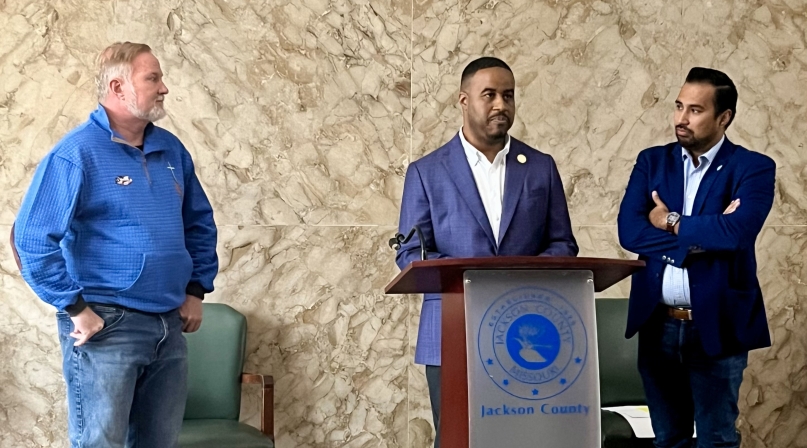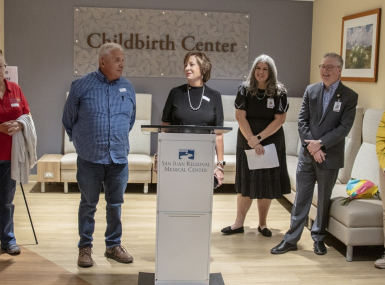Jackson County chair combines diverse experiences for effective leadership

Key Takeaways
A fellowship funded by the Congressional Black Caucus kick-started DaRon McGee’s career in public service, but his promise to his mother brought him back to Jackson County, Mo., where he put himself to work.
McGee learned about the fellowship through a friend while studying at the University of Missouri-Kansas City, and when he received a fellowship, he took off for Washington, D.C. to learn from one of his state’s U.S. senators. Although he worked for a white senator, Claire McCaskill (D-Mo.), the Congressional Black Caucus Foundation funded McGee’s housing and provided a stipend during his 18-month stint in D.C. McCaskill was a former Jackson County legislator and prosecutor.
As the fellowship concluded, and a semester left to go, he prepared to take a job with the Congressional Research Service, but then his mother got in his ear.
“Back then, remote classes were very different, and UMKC had a rule that you had to do your last semester on campus,” McGee said. “I figured I would just start working and that would be the end of that, but my mom reminded me that I promised to finish college.”
So we went home to Kansas City, and graduated, right in the middle of the Great Recession. But a maternity leave by a county legislative staffer opened the door to five months of work for McGee, and an introduction to county government. He parlayed that experience into five years working in the county public health department, helping oversee drug treatment programs funded with $30 million a year through a sales tax.
When his state legislator retired, McGee ran and won, serving nearly four years, including as the ranking Democratic member on the House Education Appropriations Committee. Though it was a special election, fortunate timing helped boost turnout in an off-year race.
“Election Day just happened to be the day the Royals were celebrating winning the World Series,” he said. “I ran ads saying ‘Come on out to the parade and then vote.’”
The pace of the slow state legislative process wore on McGee, who worked on what seemed to be a no-brainer bill — banning celebratory gunfire — but by the time McGee left the Legislature in 2019, the bill was still more than five years from passage.
He saw faster results two years later while working for a community development corporation. With plenty of vacant storefronts and a population in need of COVID vaccines, he helped place a clinic in an empty property, relieving bottlenecks that were slowing down the healthcare delivery system.
“We had health people coming to the health centers to get their vaccines, which kept them out of hospitals and doctors’ offices where they might come in contact with sick people,” he said.
He was recruited to run for the Hickman Mills C-1 School District Board, serving as president, when he was again recruited to run, this time for the county Legislature. Adding to that intrigue of the county race was the redistricting effort already in progress.
“I thought I was going to be running in one district against two people and I wound up unopposed by the time it was all over,” he said. “For some people, it’s horrible, because they ended up running against friends. It actually worked out pretty well for me.”
Now in his third year in the Legislature, he’s serving his second term as president. He hopes to help the county set long- and medium-term targets for development, and to continue progress the Legislature made after resolving an impasse with the county executive on how to spend the county’s American Rescue Plan Act funding.
“What do we want this thing to look like in three to five years?” he said.
“I’ve learned that an individual county legislator does have a lot of power and influence, but if they’re not on the same page with their colleagues, it can be very difficult,” he said. “It’s necessary to build relationships and understand what people’s priorities are and how you can help each other.”
I think the biggest lesson that I’ve learned in leadership is listening to my colleagues, hearing what they want and where we can go and work together on their priorities.
“I just try to practice inclusive leadership because we may not agree on a vote today, but tomorrow, I may need you on something else and we may agree. It’s so important to never, ever close the door on anybody.”
His district, in the southeastern corner of Jackson County against the Kansas border, is majority Black, middle class and older than the county median age, and home to many independent living centers. His 180,000-person county district is much larger than his 35,000-person state House district. He represents parts of Kansas City and Raytown and all of his native Grandview and works as community relations director for a health center.
“I think the biggest issue we’ve been dealing with here has been the rise in property taxes, as property values rise and the tax rate keeps up, a lot of residents who thought they had budgeted well after they paid their mortgages off, are finding themselves trying to account for $7,000, $8,000 in annual increases,” he said. “Meanwhile, the state Legislature passed a senior property tax program that allows us to cap their property taxes at its current level, but that will be a problem long-term for counties across the state, because now you’re talking about decreased revenue. There’s no easy way out.”
McGee serves as a vice chair of NACo’s Large Urban County Caucus. He wants residents to better understand how they interact with the county government.
“City Hall gets a lot more action than we get at the County Courthouse and people pay attention to the mayor and the City Council here and they pay less attention to the Jackson County comings and goings,” he said.
“From my perspective, I think that is problematic, because people just don’t know what we do, the public doesn’t show up for our meetings and we can be done in 20 minutes,” he said. “That’s not the kind of engagement we need to serve our residents better.”
Related News

Now I know I can adapt my communication style
San Juan County, N.M. Commissioner Terri Fortner spent her career working with people one-on-one, but she overcame hangups about online communication when the pandemic forced her onto video calls when she first took office.

County service meets a veteran’s need for purpose in Spotsylvania County, Virginia
After Drew Mullins transitioned from a high-performance lifestyle in the military, he found the environment and purpose he sought when he took office in his county.
Now I know that solid waste is complicated
Custer County, Idaho Commissioner Will Naillon says solid waste removal is "one of the things that people often take for granted until it’s their job to make sure it happens... that’s the story of being a county commissioner."
